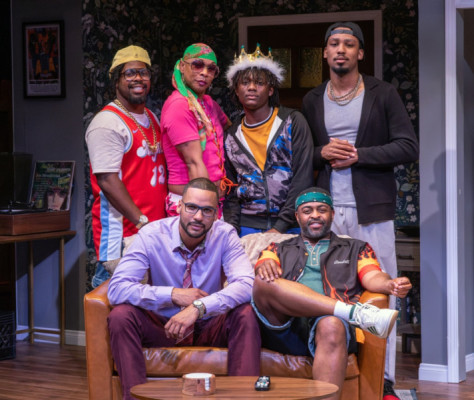 Two From CSUSM Receive Craig Noel Award NominationsTwo members of the Cal State San Marcos community have been nominated for the Craig Noel Award for “Outstanding Featured Performance in a Play.” Hosted annually by the San Diego Theatre Critics Circle (SDTCC), the Craig Noel Awards recognize the achievements of professional theatres throughout San Diego County. The award show is Feb. 16 at the Joan B. Kroc Theatre. Kevane Coleman, an administrative support coordinator for the College of Humanities, Arts, Behavioral and Social Sciences, has been nominated for his role in “The Hot Wing King” at the Cygnet Theatre. Zack King, a lecturer in the School of Arts, has been nominated for his role in “To My Girls” at the Divisionary Theatre. “Several years ago, I made a conscious shift to center my work more fully in Blackness/Brownness and Queerness,” Coleman said. “I knew that choice might come with risk. I wondered if I would work less, if narrowing my focus would somehow limit my opportunities. Instead, the opposite has been true. I have continued to work just as consistently as I did when I was primarily performing in white-centered stories, if not more, and my heart is full because the art that I am making now is so much fuller and richer for me.” SDTCC is a nonprofit organization of professional writers in San Diego County. The Craig Noel Awards, named in honor of the late artistic director of the San Diego Old Globe Theatre and a champion of the arts nationwide, highlight the excellence of professionals in San Diego theater. Nominees were chosen by an all-volunteer membership of professional critics who write year-round for San Diego newspapers, magazines and online publications. Media Contact Eric Breier, Interim assistant director of editorial and external affairs ebreier@csusm.edu | Office: 760-750-7314
Two From CSUSM Receive Craig Noel Award NominationsTwo members of the Cal State San Marcos community have been nominated for the Craig Noel Award for “Outstanding Featured Performance in a Play.” Hosted annually by the San Diego Theatre Critics Circle (SDTCC), the Craig Noel Awards recognize the achievements of professional theatres throughout San Diego County. The award show is Feb. 16 at the Joan B. Kroc Theatre. Kevane Coleman, an administrative support coordinator for the College of Humanities, Arts, Behavioral and Social Sciences, has been nominated for his role in “The Hot Wing King” at the Cygnet Theatre. Zack King, a lecturer in the School of Arts, has been nominated for his role in “To My Girls” at the Divisionary Theatre. “Several years ago, I made a conscious shift to center my work more fully in Blackness/Brownness and Queerness,” Coleman said. “I knew that choice might come with risk. I wondered if I would work less, if narrowing my focus would somehow limit my opportunities. Instead, the opposite has been true. I have continued to work just as consistently as I did when I was primarily performing in white-centered stories, if not more, and my heart is full because the art that I am making now is so much fuller and richer for me.” SDTCC is a nonprofit organization of professional writers in San Diego County. The Craig Noel Awards, named in honor of the late artistic director of the San Diego Old Globe Theatre and a champion of the arts nationwide, highlight the excellence of professionals in San Diego theater. Nominees were chosen by an all-volunteer membership of professional critics who write year-round for San Diego newspapers, magazines and online publications. Media Contact Eric Breier, Interim assistant director of editorial and external affairs ebreier@csusm.edu | Office: 760-750-7314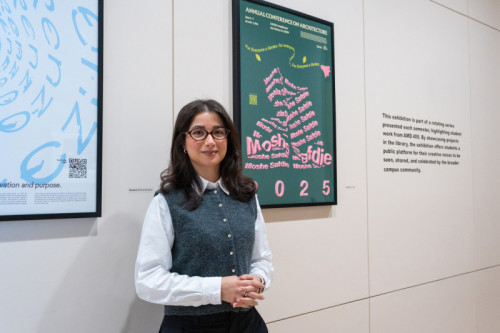 New Gallery Showcases Student Art in LibraryThe event that inspired the class project was imaginary. But for Sonia Ellis and fellow Cal State San Marcos art students, the payoff was very real. Last year, Ellis was a student in AMD 409: Advanced Graphic Design and Visual Arts, an upper-division class taught by Ghazal Foroutan. The assignment: Using only typography, create a promotional poster for a hypothetical California architecture conference being hosted by CSUSM. The twist: Some of the posters that resulted would be displayed as part of a new student art gallery in Kellogg Library. Ellis made a poster about acclaimed Israeli-Canadian-American architect Moshe Safdie, and hers was one of 19 selected for the exhibit. “I was thrilled and honored to have my work chosen to be displayed in the library and kept in the archive,” said Ellis, an art, media and design major who’s scheduled to graduate this spring. “It gave a greater sense of purpose to the project.” The 19 posters compose the first installment of the Cougar Gallery, which is located on the library’s second floor, occupying the wall space between the Makery’s entrance and the stairwell down the hall. Foroutan said the idea came from a conversation with fellow art, media and design professor Kristin Moss, and it was brought to fruition through a collaboration with multiple employees of the library: associate dean Char Booth, outreach librarian Irma Ramos Arreaga, arts and humanities librarian Torie Quiñonez, and administrative coordinator Arely Ayala. The initial exhibit has adorned the library’s walls since the start of the fall semester. “Seeing the students’ work displayed in a prominent campus space has been incredibly meaningful,” Foroutan said. “As a professor, I am proud to share their work with the broader campus community and to see it recognized by the department and the library. “For students, the exhibition validates their efforts beyond the classroom. Many have already photographed their posters and plan to list the show as a group exhibition on their CVs, as well as include the work in their portfolios.” The Cougar Gallery, Booth said, fulfills a longstanding desire to increase the presence and visibility of student art in the library. As a prominent display of creative student work, it joins the Data Stacks on the library’s fourth floor. "By establishing this new gallery, we are showcasing the creative talents of CSUSM student artists and designers and dedicating a highly visible area of the library to School of Arts students and faculty as a much-needed supplementary gallery space,” Booth said. Once she was assigned Safdie as her subject (other famous architects featured include Frank Lloyd Wright and Frank Gehry), Ellis set out to make a poster that would promote a hypothetical discussion with the architect at the conference while also channeling the style and philosophy of that architect. In researching Safdie’s life and work, Ellis was drawn to his design theory, “For Everyone a Garden.” “He envisions architecture as a living, evolving environment, integrating gardens and green space into almost all of his designs,” she said. “That phrase became my guiding concept and tagline for the poster, inspiring my color palette and imagery.” Ellis incorporated both physical art and digital design in the creation of her poster. She also designed an accompanying booklet in the same style as the poster to round out the promotional material. “Over the weeks of working on the project, we all watched each other's concepts evolve in the studio, so seeing them printed professionally and displayed in a space where so many students pass through was very meaningful,” said Ellis, who plans to apply for the CSUSM teaching credential program, with a goal of becoming an art educator. Foroutan hopes to work with the library to rotate the exhibition at least once a year to showcase as many as much student artwork as possible. “While the overall framework of the project will remain consistent, I plan to subtly revise the assignment each year to introduce new constraints, tones or conceptual directions, allowing the exhibition to evolve over time,” she said. Media Contact Brian Hiro, Communications Specialist bhiro@csusm.edu | Office: 760-750-7306
New Gallery Showcases Student Art in LibraryThe event that inspired the class project was imaginary. But for Sonia Ellis and fellow Cal State San Marcos art students, the payoff was very real. Last year, Ellis was a student in AMD 409: Advanced Graphic Design and Visual Arts, an upper-division class taught by Ghazal Foroutan. The assignment: Using only typography, create a promotional poster for a hypothetical California architecture conference being hosted by CSUSM. The twist: Some of the posters that resulted would be displayed as part of a new student art gallery in Kellogg Library. Ellis made a poster about acclaimed Israeli-Canadian-American architect Moshe Safdie, and hers was one of 19 selected for the exhibit. “I was thrilled and honored to have my work chosen to be displayed in the library and kept in the archive,” said Ellis, an art, media and design major who’s scheduled to graduate this spring. “It gave a greater sense of purpose to the project.” The 19 posters compose the first installment of the Cougar Gallery, which is located on the library’s second floor, occupying the wall space between the Makery’s entrance and the stairwell down the hall. Foroutan said the idea came from a conversation with fellow art, media and design professor Kristin Moss, and it was brought to fruition through a collaboration with multiple employees of the library: associate dean Char Booth, outreach librarian Irma Ramos Arreaga, arts and humanities librarian Torie Quiñonez, and administrative coordinator Arely Ayala. The initial exhibit has adorned the library’s walls since the start of the fall semester. “Seeing the students’ work displayed in a prominent campus space has been incredibly meaningful,” Foroutan said. “As a professor, I am proud to share their work with the broader campus community and to see it recognized by the department and the library. “For students, the exhibition validates their efforts beyond the classroom. Many have already photographed their posters and plan to list the show as a group exhibition on their CVs, as well as include the work in their portfolios.” The Cougar Gallery, Booth said, fulfills a longstanding desire to increase the presence and visibility of student art in the library. As a prominent display of creative student work, it joins the Data Stacks on the library’s fourth floor. "By establishing this new gallery, we are showcasing the creative talents of CSUSM student artists and designers and dedicating a highly visible area of the library to School of Arts students and faculty as a much-needed supplementary gallery space,” Booth said. Once she was assigned Safdie as her subject (other famous architects featured include Frank Lloyd Wright and Frank Gehry), Ellis set out to make a poster that would promote a hypothetical discussion with the architect at the conference while also channeling the style and philosophy of that architect. In researching Safdie’s life and work, Ellis was drawn to his design theory, “For Everyone a Garden.” “He envisions architecture as a living, evolving environment, integrating gardens and green space into almost all of his designs,” she said. “That phrase became my guiding concept and tagline for the poster, inspiring my color palette and imagery.” Ellis incorporated both physical art and digital design in the creation of her poster. She also designed an accompanying booklet in the same style as the poster to round out the promotional material. “Over the weeks of working on the project, we all watched each other's concepts evolve in the studio, so seeing them printed professionally and displayed in a space where so many students pass through was very meaningful,” said Ellis, who plans to apply for the CSUSM teaching credential program, with a goal of becoming an art educator. Foroutan hopes to work with the library to rotate the exhibition at least once a year to showcase as many as much student artwork as possible. “While the overall framework of the project will remain consistent, I plan to subtly revise the assignment each year to introduce new constraints, tones or conceptual directions, allowing the exhibition to evolve over time,” she said. Media Contact Brian Hiro, Communications Specialist bhiro@csusm.edu | Office: 760-750-7306
- Donate to the Student Athlete Advisory Committee Basic Needs DriveThe Student Athlete Advisory Committee will be hosting a basic needs drive from Feb. 2-8 to donate to our local community. We are kindly requesting donations, including but not limited to: warm clothing, non-perishable food items, household items, new hygiene products, etc. Donations will be accepted in the Clarke Field House suites as well as upcoming CSUSM Home games! Free admission will be given to those who bring a donation. We will be collecting donations at REC Night ahead of the men’s and women’s basketball double header games beginning at 5 pm. Follow our Instagram page @csusm_saac for more info and updates! Come support our athletic teams and a good cause!!

- CSUSM to Host Second Event Spotlighting Veterans' StoriesCal State San Marcos will host an event in April that will continue its initiative to preserve and amplify the stories of San Diego County military veterans through recorded oral histories. As part of the biannual Arts & Lectures series and in concert with community partner Veteran Lore, CSUSM will hold Veterans History Project II: The Journey Continues on Wednesday, April 8. The event builds on the success of the inaugural edition that took place last year; it’s co-hosted by Jason Beyer, a CSUSM double alumnus and U.S. Marine Corps veteran, and Marilyn Huerta, a CSUSM communications professional, double alumna and military-affiliated advocate. The program will share more of the work that’s included in the San Diego Veterans History Initiative, a project through the CSUSM library’s Special Collections department that reflects the university’s ongoing commitment to community engagement, veteran support and experiential learning. “The San Diego Veterans History Initiative is deeply personal for me as a Marine, an alumnus and now as a professional committed to serving our veteran community,” Beyer said. “These stories deserve to be heard, preserved and honored. By continuing this project and expanding it to include career connections, we’re not only reflecting on service, but actively supporting veterans as they transition and thrive beyond the military.” The evening will begin with a reception, resource fair and expanded career fair from 5-6 p.m., offering veterans and military-affiliated guests the opportunity to connect with campus departments, community organizations and employers interested in hiring veterans. The formal program will follow from 6-8 in the University Student Union ballroom on the CSUSM campus. The formal program will feature keynote speaker Jim Gruny, a U.S. Marine Corps veteran and retired colonel, followed by a film screening showcasing professionally recorded oral histories of veterans representing diverse backgrounds and service experiences. The recorded interviews will be archived in the CSUSM library’s Voices of North County collection and the U.S. Library of Congress, contributing to the national Veterans History Project and preserving veterans’ legacies for future generations. “This event is about creating space for stories, for connection and for opportunity,” Huerta said. “Veterans History Project II allows us to honor the lived experiences of veterans while building meaningful bridges to resources, careers and community. Preserving these stories through the CSUSM library Special Collections department and the Library of Congress ensures that their impact will extend far beyond one evening.” The oral histories this year will feature veteran stories from: Virginia F. Burke, U.S. Army (1968-70), first lieutenant (O-2) William D. Felty (CSUSM alumnus), U.S. Marine Corps (2003-07), corporal (E-4) Edmund Joseph Labrado Jr., U.S. Army (1969-70), captain (O-3) Joshua K. Loop (CSUSM alumnus), U. S. Coast Guard (2008-17), lieutenant (O-3) Dora L. Luevano, U.S. Marine Corps (1965-67), corporal (E-4) Thomas J. Moore (CSUSM alumnus), U.S. Marine Corps (1993-2019), master sergeant (E-8) ret. David B. Shaffer, U.S. Air Force (1963-67), captain (O-3) The event is open to the public, with free tickets available for CSUSM students and military-affiliated guests. Advance ticket reservations are encouraged. Organizations interested in hiring veterans are encouraged to reserve space in the career fair. For tickets and additional event information, visit the Arts & Lectures website.
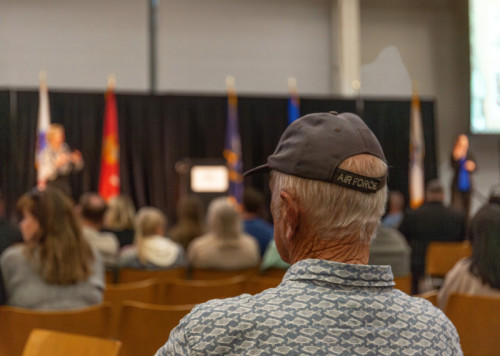
- Black Student Center to Host Monthlong Black Excellence CelebrationAs Cal State San Marcos commemorates Black Excellence Month, the Black Student Center will host a series of events to celebrate the brilliance and resilience across CSUSM through arts, education, student engagement and community fellowship. The monthlong celebration will conclude with the annual Black Excellence Gala on Feb. 27. Black Excellence Month Kickoff Feb. 2, 11:30 a.m.-2 p.m., USU 2310 The Black Student Center (BSC) will kick off the celebrations with a brief presentation discussing the history of the Pan-African flag, a raising of the flag and a live drumline performance. Food will be provided at the event, which is open to all students. Def Jam Open Mic Night Feb. 5, 5-7 p.m., USU Amphitheater The BSC, in collaboration with the Cross-Cultural Center, invites students to enjoy a night of poetry, spoken word and music. The event is open to all students. Professional Styling: How to Tie a Tie Feb. 9, 1-2 p.m., USU 4200 As part of the “My Brother’s Keeper” initiative, the BSC will host a session of professional styling to teach students how to tie a tie. The event is open to all students. Sista Fest Feb. 10, 5-7 p.m., USU 2310 In collaboration with the Women and Gender Equity Center, the BSC will host an event to celebrate Black women on campus. This year’s theme, “Rooted and Radiant,” is focused on providing mentorship to young Black women looking to navigate professional spaces. The keynote speaker is Wendy Stewart, MiraCosta College’s chief diversity officer. The event is open to all students. Black Jeopardy Game Night Feb. 13, 5-7 p.m., USU Ballroom Students are welcome to join the BSC for a night of culturally relevant games. Food will be provided on a first-come, first-served basis. Carnaval Feb. 18, 5-8 p.m., USU Ballroom Join the BSU and the Latinx Center for a celebration of dance and heritage from various communities across Latin America and the African diaspora. The event will feature live music, cultural foods and mask painting inspired by Rio de Janeiro’s Carnaval and New Orleans’ Mardi Gras festival. Ebony Fashion Show Feb. 20, 5-8 p.m., USU Ballroom The inaugural Ebony Fashion Show will provide a space for students to showcase their elegance on the runway. The event will highlight the creative expression of students across CSUSM student centers to showcase cultural displays through fashion. Black Org Fair Feb. 25, 5-7 p.m., Forum Plaza All students are invited to learn about the various Black student organizations at CSUSM. Representatives will be featured from various academic, social, faith-based and national Panhellenic Council organizations. 2/27 Black Excellence Gala Feb. 27, 5:30-8:30 p.m., USU Ballroom As the finale of Black Excellence Month, the BSC will host an inaugural event in collaboration with Tukwut Life to celebrate and highlight the Black community. The evening will showcase achievements and inspiring stories from the community, followed by a student performance and live DJ. Guests are encouraged to dress in their finest attire to honor the occasion and the remarkable accomplishments being celebrated. Media Contact Eric Breier, Interim Assistant Director of Editorial and External Affairs ebreier@csusm.edu | Office: 760-750-7314
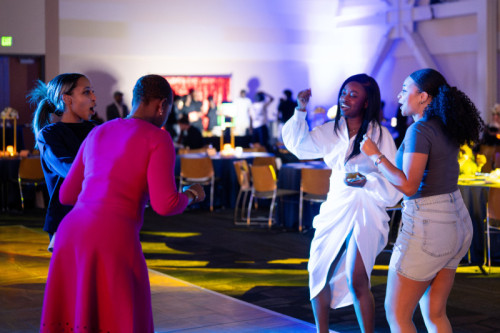
- Professor Involved in Statewide Survey on Ocean AccessShannon Switzer Swanson, a Cal State San Marcos assistant professor of environmental studies, is involved in a statewide research project that seeks to understand how Californians value the Pacific coastline and the barriers they face in accessing it. Swanson, who’s in her fourth year as a faculty member at CSUSM, is serving as a research associate for the California Marine Sanctuary Foundation, a Monterey-based nonprofit that champions science-based solutions to protect ecosystems and strengthen community resilience. She was enlisted last summer by head researcher Jennifer Selgrath to lead the project’s efforts in San Diego County, primarily through the circulation of a survey about ocean access. This spring, she also will help with interviews and focus groups in the area, as well as data analysis and dissemination. The multiphase project is being funded by the California Ocean Protection Council. “They want to understand how to more effectively allocate their funds to improve coastal access for all Californians who would like to spend time on our coastline,” Swanson said. “Not just improve access, but improve the experience in these beach/coastal/ocean spaces.” Swanson said preliminary results from the nearly 5,000 people statewide (about 500 in the county) who have taken the survey show a desire for better-maintained public restroom facilities and training resources that can familiarize people with environmental concerns, including how to interact safely with wildlife. In addition to affecting policy and budget allocation, the results will inform managers of the state’s marine protected areas (MPAs) about Californians’ baseline understanding of the MPAs and national marine sanctuaries along our coast. “There are numerous other applications,” Swanson said. “We are amassing a truly large and diverse data set that includes voices historically overlooked in coastal management conversations. We envision the data informing state and federal policy toward a new era of improved coastal access for a larger segment of California's population, including inland and marginalized communities who do not always feel safe or welcomed at the coast." The survey will be open until the end of February. People who fill it out will be entered into a drawing for ocean-related prizes, such as whale watching tours. The survey can be found at the California Ocean Access website. Contact the project coordinator, Manuela Diaz, at manueladiaz@ucsb.edu for more information as well as social media assets to spread awareness of the survey. Media Contact Brian Hiro, Communications Specialist bhiro@csusm.edu | Office: 760-750-7306
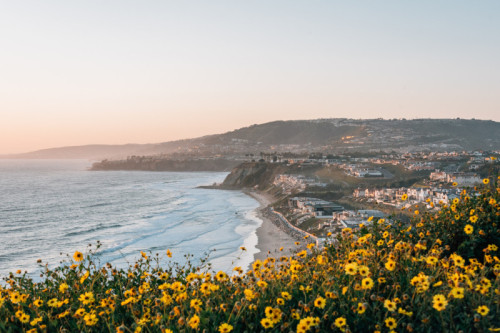
- CSUSM Ranked No. 1 Family Nurse Practitioner Program for 2026Cal State San Marcos is No. 1 in the “Family Nurse Practitioner Program” rankings in California for 2026 by the Registered Nursing Organization. Schools listed in this ranking offer experienced faculty, strong clinical training and great student support. The Registered Nursing Organization uses databases from nursing programs of all degree levels and specializations across the U.S. to create its rankings. Rankings follow criteria from both graduate and undergraduate programs, including the number and variety of nursing programs offered by the institution as well as the ratio of total nursing program completions to total program completions awarded by the institution. These rankings provide students with the information needed to make the right choice when applying for nursing school. CSUSM prioritizes creating an environment for all nursing students to grow so they feel prepared when stepping into future healthcare jobs. The Registered Nursing Organization aims to promote excellence in nursing by enabling future and current nurses with the education and employment resources needed to succeed. Media Contact Eric Breier, Interim assistant director of editorial and external affairs ebreier@csusm.edu | Office: 760-750-7314
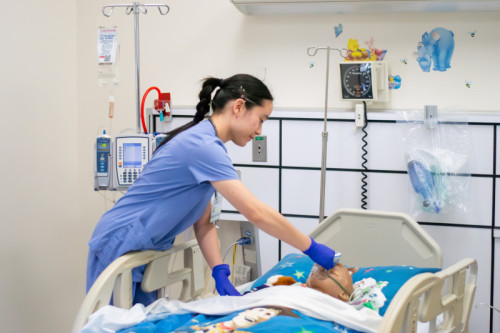
- Arts & Lectures Brings Music, Dance and History to CSUSMThe Arts & Lectures series returns to Cal State San Marcos this spring with concerts, performances and talks aimed at sharing music, dance, science and history. Events will take place across campus from January through April. All events are free for CSUSM students. Ching-Ming and Friends Chamber Concert Jan. 27, noon-1 p.m., Arts 111 Joined by CSUSM music professor Ching-Ming Cheng, the 11th annual Villa-Lobos International Chamber Music Festival will take place on campus to bring music composed entirely by Latin American composers. The program aims to celebrate Latin American chamber music across Southern California. CSUSM students: Free Faculty/staff/alumni: $5 Community: $10 Sponsored by the Funes Fund Gila Goldstein Piano March 10, noon-1 p.m., Arts 111 Internationally acclaimed pianist Gila Goldstein will perform a lunch-time recital on campus. The performance will include works by Vivaldi, Bach, Mendelssohn, Guastavino, Villa-Lobos, Lecuona, Ronn Yedidia and Gershwin. Before the event, there will be a piano master class on March 9 at noon in Academic Hall 104. CSUSM students: Free Faculty/staff/alumni: $5 Community: $10 Sponsored by the Funes Fund Stories From Home March 13, 6:30-8 p.m., Arts 111 “Stories From Home” is a series of dances embodying the oral traditions of Nuevomexicano, Chicano and Mexican American communities in the American Southwest. Choreographer Yvonne Montoya and a diverse cast of dancers draw upon personal histories as well as ancestral knowledge. The performance is a vessel for personal and specific tales, while also offering a broader look at various cultural traditions throughout the Southwest. An artist meet-and-greet will take place March 10 from noon to 1:30 p.m. at the Cross-Cultural Center. CSUSM students: Free Faculty/staff/alumni: $5 Community: $10 A Marriage of Art and Science: Entwined Research in a Nuclear Family March 23, 10:30 a.m.-1:30 p.m., USU Ballroom Art and science intersect with elin O’Hara slavick’s art, which maps radioactive residuum, and David Richardson’s epidemiological studies of radiation’s human impact. Slavick, who wrote “Bomb After Bomb: A Violent Cartography and After Hiroshima,” is an internationally exhibiting artist who captures the lingering effects of radiation with audiographs and creates contact prints of tree rubbings and architecture exposed to atomic bombings of Hiroshima, Nagasaki and Fukushima. Richardson, an epidemiologist who’s conducted studies of cancer among U.S. federal nuclear workers and Japanese survivors of the atomic bombings of Hiroshima and Nagasaki, is the lead writer on the United Nations Committee of Epidemiological Studies of Radiation and Cancer (UNSCEAR). CSUSM students: Free Faculty/staff/alumni: $5 Community: $10 Co-sponsors: Center ARTES STEAM ambassadors Peter Sprague Group Featuring Allison Adams Tucker March 24, 7-8:30 p.m., Arts 111 Masterclass 2:30-3:45 p.m. in Arts 111, open to the public Guitarist Peter Sprague loves jazz, but he also dips deep into musical history and unearths some sonic gems from the Beatles, Jimmy Webb and Antonio Carlos Jobim. For this concert, he connects with vocalist Allison Adams Tucker, pianist Danny Green, drummer Duncan Moore and bassist Mack Leighton for an evening of good sounds, good vibes and good times. The group recently released three albums: “All You Need Is Love” (Beatles), “Christmas Time Is Here” and “Peter Sprague Plays Jobim.” CSUSM students: Free Faculty/staff/alumni: $5 Community: $10 Veterans History Project II: The Journey Continues April 8, 5-8 p.m., USU Ballroom This event, which showcases recorded oral histories of military veterans, offers an intimate look into the personal experiences, challenges and triumphs of veterans from diverse backgrounds. Stories shared will be archived at CSUSM’s Kellogg Library and the U.S. Library of Congress, preserving their legacies for future generations. The keynote speaker will be Jim Gruny, a retired colonel in the Marine Corps. The formal program begins at 6 p.m., preceded by a reception and veteran resources and career fair. CSUM students/military-affiliated guests: Free Faculty/staff/alumni: $5 Community: $10 For more information, including ticket information, visit the Arts & Lectures series website. Media Contact Eric Breier, Interim Assistant Director of Editorial and External Affairs ebreier@csusm.edu | Office: 760-750-7314
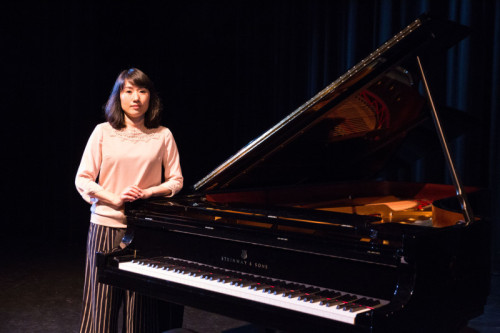
- Alumnus Wins National Award for SalesCal State San Marcos alumnus Maxwell Paulin recently was honored as the top first-year salesperson by Southwestern Advantage, the oldest entrepreneurial program in the United States for university students. Paulin won the award from a pool of nearly 1,000 current or former college students. He was recognized at the 27th annual J. Fred Landers Awards Banquet held in Nashville, Tenn. Paulin is a native of Christchurch City, New Zealand who graduated from CSUSM last May with a degree in global business. He received the award for his work running a business selling educational resources to Wisconsin families. Through the Southwestern Advantage sales and leadership program, he met with about 2,000 families, and his business produced over $115,000 in revenue. Nashville-based Southwestern Advantage has operated a sales and leadership program for college and university students from around the world since 1868. The entrepreneurial program offers students the opportunity to learn how to run a business, gain valuable soft skills and help offset their educational expenses. Media Contact Brian Hiro, Communications Specialist bhiro@csusm.edu | Office: 760-750-7306
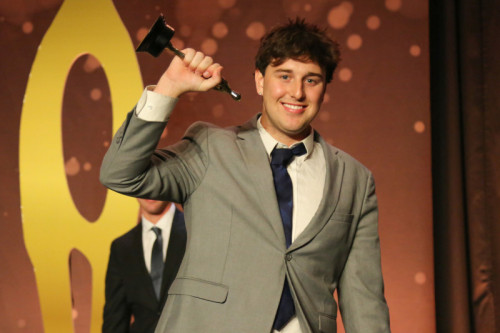
- Internships Help Shape Student’s Future in Public PolicyIlleana Carmona Chavez arrived at Cal State San Marcos certain she was headed for law school. But after she graduates with her bachelor’s in criminology and justice studies this spring, she will embark on a far different course, one that has taken her from student government to the governor’s office. The change in focus was shaped by her deep involvement in Associated Students, Inc., where she serves as the chair and chief of staff of CSUSM’s student government. Through ASI, Chavez joined Lobby Corps, an advocacy-focused volunteer group, and later traveled to Sacramento for the California Higher Education Student Summit, where she met with state legislators alongside students from across the CSU system. But the final realization of where her career was headed came from an internship opportunity. It was through ASI that Chavez met Zach Bunshaft, CSUSM’s director of government relations at the time. “Interning with Zach and seeing how higher education policies at the state level affected our campus was so impactful,” Chavez said. “These opportunities, being part of ASI and interning with Zach, changed the trajectory of my life and what I want to do.” CSUSM’s emphasis on internships proved transformational for Chavez. It not only prepared her for the professional world, it helped her discover the type of work that she’s truly passionate about. During her time as a government relations intern last spring, Chavez researched legislative officials to strengthen CSUSM’s advocacy efforts, engaged with policymakers at key events and explored ways to enhance student support across the region. As the internship was nearing its end, Bunshaft met with Chavez to review the experience. When Bunshaft asked about Chavez’s future goals, she told him how much she enjoyed the internship and how the experiences she had were the types of spaces she wanted to be in. The timing was perfect. Bunshaft had just learned about another internship opportunity with Gov. Gavin Newsom’s office. Bunshaft mentored Chavez throughout the hiring process, and she was hired as an external affairs intern for Newsom’s San Diego regional office. Her responsibilities included everything from supporting outreach efforts to drafting briefs and assisting with newsletters. “Illeana is a thoughtful, driven and reliable leader with an incredibly bright future,” said Bunshaft, who left CSUSM in December to become Newsom’s Southern California regional director of external affairs. “She has the innate ability to see the big picture and work together with others to inspire and achieve common goals. “I’ve had the pleasure of watching her confidence and skills grow with each new opportunity she enthusiastically embraces. I’m excited to see all that she will continue to accomplish in her academics, career and public service journey.” Chavez completed the internship with Newsom’s office in December. As she begins her final semester at CSUSM, she’s already looking ahead to the fall. She’s in the process of applying for graduate school to pursue a master’s in public policy or public administration (Cal State Fullerton, Sacramento State and San Diego State are her top choices). She’ll take the lessons she learned in her internships with her to grad school and beyond. She knows the internship process can be intimidating for students, but she has seen firsthand how it pays off. “The connections that we make in these internships, you never know where they're going to lead you,” she said. “I never imagined that doing an unpaid internship with Zach was going to lead me to the governor's office. “Whether it's paid or unpaid, there are so many opportunities. No matter what, even if it seems like you are the most unqualified person in the room to do that job, just go for it. You never know what can come of that opportunity.” Media Contact Eric Breier, Interim Assistant Director of Editorial and External Affairs ebreier@csusm.edu | Office: 760-750-7314
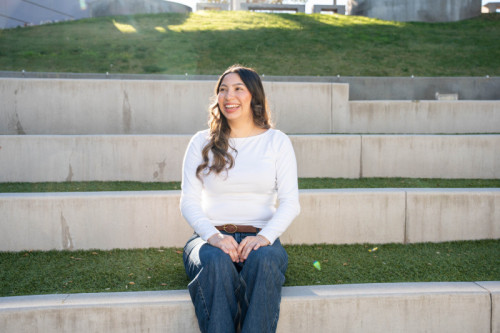
- Seeking Healthy Adults for Exercise Training StudyHealthy adults ages 18 - 60 years old are needed to take part in a 12 week exercise training study taking place on main campus at CSUSM. Exercise training consists of two 10 minute sessions per week for 12 weeks. Study completion provides an incentive equal to $250. For more information, contact Dr. Todd A. Astorino, Professor, Department of Kinesiology at astorino@csusm.edu.

- Dustin Calvillo: A Legacy of CareA celebration of life for CSUSM professor Dustin Cavillo will be held 2-4 p.m. on Friday, Jan. 16, at the Faculty Center Suite Sometimes we get lost in life between that blurry area of who we are as workers vs. who we are as humans. We often are seen by others — even self-identify — by our career. Dustin Calvillo didn’t subscribe to this philosophy. Oh, to be clear he loved his job as professor of cognitive psychology in the psychology department at Cal State San Marcos. There are no doubts about this. He was dedicated to his research, unselfishly helpful to his colleagues and shared his love for the topics he found fascinating with his students. But he was the type of person to keep his professional passions just slightly but clearly on a rung below his true loves — family and connecting with life. Calvillo lost a battle with oral cancer in August. He was 49. After nearly 18 years at CSUSM, his loss has loomed heavy over one of the most populous departments on campus. But his legacy lives on. The psychology department will host a celebration of life for Calvillo on Friday, Jan. 16, at the Faculty Center Suite. The gathering runs 2-4 p.m. and will include coffee and light appetizers. “I feel incredibly fortunate to have worked alongside Dustin in many roles during our years at CSUSM,” said Elisa Grant-Vallone, who worked with Calvillo as a faculty colleague as well as in a collaborative position in her role as the CHABSS associate dean of operations & budget. “He was one of the kindest, most compassionate and thoughtful colleagues I have ever known. We team-taught Introduction to Psychology for several years, and although he was earlier in his career than I was, I often found myself learning from him. Dustin was an exceptional instructor. He challenged his students to work hard while, as a cognitive psychologist, thoughtfully designing a framework that gave them the support they needed to succeed.” Calvillo served as a professor of cognitive psychology who dedicated his work to advancing our understanding of memory, reasoning, decision-making and the ways biases and misinformation shape our thinking. A product of the California State University system, he earned both his bachelor's and master's degrees from Cal State Bakersfield. He went on to earn a Ph.D. in psychology (cognitive and perceptual sciences) from the University of California, Santa Barbara. Michelle Vogel Trautt is a lecturer in psychology at CSUSM. She knew Calvillo not only as a colleague but also as a mentor during her time on campus in the master’s program. “Dustin was kind and welcoming,” Trautt said. “He genuinely cared about others. Over time, as our relationship as colleagues evolved, Dustin became a trusted confidant that I could come to for advice, guidance and encouragement. He was dependable, steady and consistent. He was a great leader without ever having to speak of his own accolades. We just knew we were in good hands with him at the helm. His sense of humor and occasional ‘zingers’ made Dustin approachable and relatable.” What Trautt remembers most as his student in the graduate seminar was how much he “lit up” when talking about cognitive psychology. Calvillo was universally seen as being reserved outside of the classroom, a persona that changed when a class or seminar started. “I found it magical to see him become animated and excited about topics we discussed in our course,” said Trautt, who shared what she referred to as “passing-by hellos” on campus. “Even more so, when he would tell a good cognitive psychology joke and see who would chuckle as a measure of who was understanding our very dense, detailed and rigorous content. If you could laugh at the contextualized joke, he knew you were following along and retaining content enough to appreciate it from a humorous lens. It was really special.” His academic legacy included more than 50 peer-reviewed scientific journal articles-research that will continue to resonate in classrooms, conferences and public discussions about issues that include truth, trust and critical thinking. Emeritus Professor of Psychology Nancy Caine was already in the department when Calvillo was hired here nearly two decades ago. Caine was coordinator of the graduate program at the same time Calvillo served as department chair so they had overlapping administrative roles, not always easy for a faculty member so dedicated to research and teaching. Caine noted how his organization and instinct in handling difficult situations made her feel like she had a true friend and partner. “Dustin epitomized what is, in my opinion, the ideal faculty member at a place like CSUSM,” Caine said. “I really mean that. He was committed to CSUSM as a community, which meant engaging with students, colleagues, and staff on a daily basis. He understood how lucky we all are to have a job that allows us to be part of an academic community where we can be scholars, teachers and contributors to the overall mission of the university — and he did all of those very well. “He was devoted to the cause of providing opportunities to students from under-represented groups. He set a standard to which every faculty member at CSUSM should aspire.” Although he was often described as quiet, even shy around campus, Calvillo had an infectious positive demeanor behind a warm smile. Haylee DeLuca Bishop, the program director for child and adolescent development, interviewed for a faculty position at CSUSM in early 2018. She crossed paths with Calvillo during the search process as he served on the university’s Institutional Review Board. She recalled that shyness as a first impression that didn’t stick once some time working together passed. That quiet exterior melted to form a professional bond that eventually had DeLuca Bishop and her husband spending time playing bar trivia while also going to the movies and San Diego Padres and Waves games with Calvillo, his wife Angelica Rocha (a former research associate and assistant director for student support in CSUSM’s Office for Training, Research, and Education in the Sciences) and their daughter Vivian. “He was the exact colleague I wanted to be,” DeLuca Bishop said. “He was around. He was present. He was available to his students, available to his colleagues. He was a hard worker, incredibly prolific, amazing scholar, but also a great teacher. Students loved him. He was just the whole package. So when I looked at Dustin, I was like, that's pretty much where I want to be if I can.” Calvillo spent time as department chair, which took him away from some of his scholarly work to be replaced by leading a diverse group of faculty. He was a natural leader, but both DeLuca Bishop and Caine made it clear it wasn’t his first choice for a career move. “It was no secret,” DeLuca Bishop said. “He didn't really want to be a department chair. But he stepped into it because he knew he needed to. It was what the department needed at the time, and he was great at it. You couldn't tell him he was great at it. He couldn't hear that positive feedback very much. But he was great at it.” Said Caine: “Dustin didn’t like being chair. He loved doing research and teaching, both of which had to take a back seat while he served his term. But he recognized his obligation to take his turn ‘at the helm,’ and as is true of Dustin in every way, he did the job very well.” He may not have loved his time as department chair, but there was no hiding his true passions. He enjoyed traveling, playing golf, sailing, camping and watching sports, especially soccer and baseball. But his love for those activities increased tenfold when he could do them with loved ones. Beyond his professional achievements, Calvillo was a devoted family man who was happiest when he was with his loved ones. “One of my fondest memories of Dustin was seeing him as a dad,” Grant-Vallone said. “One time (Vivian) had an unexpected day off from preschool, so he brought her along to a search committee meeting. He set up her lunch box and toys, patiently answered her quiet questions, and the love between them lit up the room. Dustin will be deeply missed by everyone who had the privilege of knowing him.” Now 7, Vivian no longer has her father around, but she has his academic work that hopefully will help her understand his career passions that went beyond showing up to an office 8-5. “He accomplished a lot, and that's something I've been thinking about in general,” DeLuca Bishop said. “That's one thing I'm happy about. Viv, when she gets old enough, she can go read everything he's ever published. His legacy can live on in that work as well.” And when she wants to learn about the legacy he left behind beyond campus, the family, friends and colleagues he left behind will have plenty of stories to share. “It's just a huge loss,” DeLuca Bishop said. “And I feel it every day. I think about him every day still. He’s such a huge loss and he was my go-to person whenever something happened in the department or something I just wanted to vent about. He got it because he did the same job. And so he would know what I was feeling in a way that a lot of other people couldn't, including my partner. So, he was my go-to guy.” Jennier Lozano is a psychological science graduate student at CSUSM who works in both the MBARC and Misinformation and Memory labs, led by Assistant Professor Lisa Graves and Calvillo, respectively. As an undergraduate transfer student, she took Calvillo’s cognitive processes course. It was a transformative moment in her life to witness his enthusiasm with understanding human cognitive processes. Being mentored by Calvillo, which included attending the Western Psychological Association Convention in Riverside in 2023 with his lab, helped her discover her own research interests while solidifying her desire to pursue graduate school. “As his graduate student, his support, guidance and mentorship have had a profound and long-lasting impact on my life,” Lozano said. “I remember sitting in the back of the class thinking about how fortunate I would be to have an academic mentor like Dr. Calvillo, who was so caring and kind toward all his students. Three years later, I had the privilege to be co-mentored by him and Dr. Graves as a graduate student. I will forever be grateful for his unwavering and invaluable support, encouragement, guidance, and dedication.” The ironic part of living a full and meaningful life is that we don’t get to pick what people remember about us. So we build our legacy through showing up. Some days we show up and inspire with our work and through our relationships, while other days we’re simply lucky to show up at all. Dustin Calvillo showed up. He showed up for his colleagues and his students. He showed up for people he cared about. And that’s enough. “He was just the guy you wanted around,” DeLuca Bishop said. “He was considerate of other people. He would volunteer to make sure someone else didn't have to. He was careful with his words. He cared about his students. He cared about everyone. He was just a thoughtful individual but also a deep, intelligent, bright human being. He was really trying to address problems he saw in the world and trying to improve things, trying to make things better. He saw things going in a direction he fundamentally disagreed with, and he was trying to do research around that. He’s just one of the most thoughtful people I've ever met and in every sense of the word.”
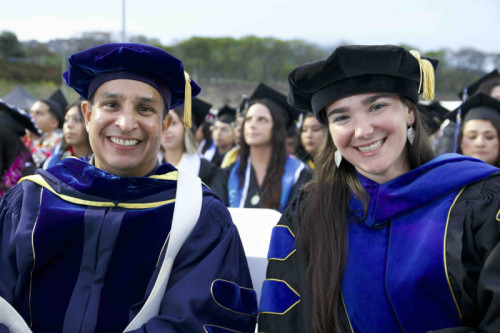
- CSUSM Awarded Prestigious Classification for Community EngagementCal State San Marcos has received the 2026 Carnegie Community Engagement (CE) Classification, an elective designation that highlights an institution’s commitment to community engagement. The CE Classification, which is awarded by the American Council on Education (ACE) and the Carnegie Foundation for the Advancement of Teaching, has been the leading framework for institutional assessment and recognition of community engagement in U.S. higher education for the past 19 years. CSUSM is one of 237 institutions that earned the CE Classification in the 2026 cycle. This marks the third time that CSUSM has received the classification, with the first occurring in 2006 when the university was one of the elite institutions that received initial classification. Along with the 40 that were classified in 2024, a total of 277 schools currently hold the designation. “I want to thank Chief Community Engagement Officer Dr. Patricia Prado-Olmos on leading this effort and congratulate all CSUSM faculty, staff, students and community partners on their contributions to this prestigious designation,” CSUSM President Ellen Neufeldt said. “At CSUSM, community engagement is not a single initiative or program. It is a defining characteristic of who we are, and it is essential to ensuring that opportunities, accountability and progress are shared by all, empowering students to transform their lives and uplift their entire communities.” CSUSM received the CE Classification for a host of programs, including: Senior Experience, which connects undergraduate business students with local organizations to address real-world challenges. Super STEM Saturday, a partnership with The Classical Academies that fosters early STEM engagement among K-12 students while also strengthening pathways to higher education. Democracy in Action, which connects students and faculty with local city governments to address real-world civic challenges. Center for Research and Engagement in STEM Education (CRESE), which fosters K-16 partnerships, advances STEM education and promotes workforce development through research, outreach and community collaborations. Mobile Wellness Initiative, a partnership with TrueCare that brings essential health care services to underserved communities in North County. Scholars in Wellness and Innovation Fast-Track (SWIFT) Health Programs, an accelerated degree pathway in the behavioral and mental health field. CSUSM’s CE Classification is valid until 2032. “CSUSM welcomes community partners into our work, and we are invited into communities because we listen and learn from the regional communities,” Prado-Olmos said. “We’ve always worked hard to maintain mutual benefit and to build trust with community partners. This designation acknowledges that CSUSM creates unique opportunities for CSUSM students that advance their learning in powerful ways.” The Carnegie Classifications are the nation’s leading framework for categorizing and describing colleges and universities in the United States. Media Contact Brian Hiro, Communications Specialist bhiro@csusm.edu | Office: 760-750-7306
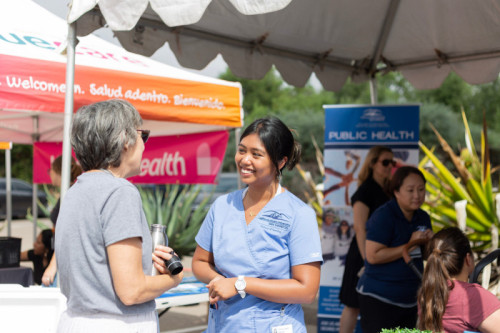
- More Than 1,000 Graduate as Fall Commencement Moves to New VenueMore than 1,000 students graduated as Cal State San Marcos held its third annual fall commencement on Monday – this time in a new venue to accommodate the growing ceremonies. A total of 1,040 graduates crossed the commencement stage as the event moved from the Sports Center on campus to Frontwave Arena in Oceanside. Fall commencement has doubled in size since it debuted in 2023, as CSUSM remains the only public university in San Diego County to hold graduation at the midpoint of the academic year. The event Monday was divided into two ceremonies. The afternoon ceremony featured 604 graduates from the College of Humanities, Arts, Behavioral and Social Sciences, and the College of Science, Technology, Engineering and Mathematics. The evening ceremony included 436 graduates from the College of Education, Health and Human Services, and the College of Business Administration. “I always say that I learn from our students more than I could ever teach them,” CSUSM President Ellen Neufeldt told the graduates. “I know without a doubt that our world needs your perspectives, your ideas, your passion and intellect, and your spirit of resilience. As you move forward, know that you are equipped and destined for greatness. Hold on to the feeling of this moment and take it with you wherever you go next.” CSUSM holds fall commencement to offer students who are graduating in December the opportunity to celebrate their accomplishments with their families without having to wait until spring. Commencement is an especially important milestone for the more than half of graduates at CSUSM who are the very first in their families to earn a bachelor’s degree. The new graduates join a distinguished group of more than 72,000 CSUSM alumni and more than 4 million California State University alumni. Nearly half of all bachelor’s degrees in California are awarded by the CSU. At CSUSM, students are prepared for in-demand careers in health care, education, business, biotechnology and public service – fields that power the region and state. Learn more about CSUSM’s economic impact.
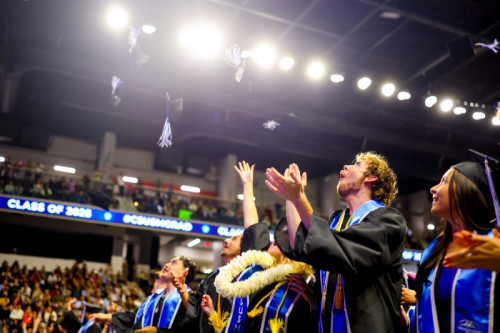
- Looking Back on Successes of 2025As the end of the year approaches, many are already looking ahead to 2026. But before putting the finishing touches on your list of New Year’s resolutions, let’s take a look back at some of the most-talked-about stories of 2025. Hunter Industries Gives Transformational $10M Donation for ISE Building In September, CSUSM announced a transformational $10 million philanthropic investment from Hunter Industries, one of the largest gifts in university history. The donation is supporting the construction of CSUSM’s new Hunter Hall of Science and Engineering, a cornerstone of the university’s commitment to preparing the next generation of engineers and scientists. Perfect Chemistry: Campus Wedding 16 Years in the Making If getting married at one’s place of employment seems unconventional, it shouldn’t to those who know biology professor Elinne Becket and chemistry professor Robert Iafe. The passion they have for their students is the same passion they have for the university, so it makes sense that the tied the knot on campus at the McMahan House on campus. CSUSM Kicks Off Historic $200 Million Fundraising Campaign Through the largest fundraising campaign in university history, CSUSM is aiming to raise $200 million to support student success and power the region’s future. The university officially launched its “Blueprint for the Future” campaign on Sept. 19. It’s an effort that combines philanthropy with grants and research funding. The campaign’s theme reflects both the physical growth on campus and the forward momentum building at CSUSM. Professor Elevates Samoan Language, Culture as Consultant for "Moana 2" Professor Grant Muāgututiʻa never could have dreamed that linguistics would take him to the shores of Oʻahu as he rubbed elbows with Dwayne “The Rock” Johnson and other stars of the Disney glitterati before the world premiere of the animated film “Moana 2” in 2024. Indeed, Muāgututiʻa was more than a little caught off guard when the filmmaking team behind the sequel to the wildly popular movie “Moana” from 2016 contacted him out of the blue two years ago. Construction of New Wellness and Rec Center Underway CSUSM held a Construction Kickoff on Nov. 12 to celebrate construction being underway for the Student Wellness and Recreation Center (SWRC), which is expected to open by summer 2027. CSUSM is partnering with Sea Breeze Properties – developers of North City, which includes CSUSM’s North Commons, The QUAD and the Extended Learning Building – on the SWRC, which will be the latest addition to campus life. Faith, Resilience Help Athlete Through Life-Threatening Crisis It all started with a headache. A seemingly normal ailment, but Malachi Wright doesn’t get headaches. And he definitely doesn’t get headaches that force him to leave work early or have him confined to the couch and throwing up for three straight days. That's when his mom, Ivonne Mancilla, knew this was something more. Wright spent the next 40 days in the hospital, undergoing three brain surgeries with no idea what the future would bring. But Wright defied all odds. Alumna Finds Purpose in Advocacy for Native Children and Families As Maya Goodblanket reflects on her time as a student, she vividly remembers the day she found the California Indian Culture and Sovereignty Center at Cal State San Marcos. Little did she know that she was meeting mentors that day who would help her achieve the career she has today. Goodblanket, a member of the Cheyenne and Arapaho Tribes of Oklahoma, serves as an Indian Child Welfare Act court advocate for the Valley Center-based Indian Health Council, which provides health and wellness services for American Indian communities in north San Diego County. Ask the Expert: A Scientific Perspective on the L.A. Fires When the hills above Los Angeles exploded in flames early last month, Matt Rahn snapped into action. Rahn, though, isn’t a firefighter who was called into duty to help battle what became one of the biggest and most destructive fires in California history. Rather, he’s a wildfire researcher at Cal State San Marcos who, in 2019, created a unique degree program called Wildfire Science and the Urban Interface. He’s also the executive director of the Wildfire Conservancy, a nonprofit research foundation dedicated to serving the state’s firefighters and protecting its communities. Cougar Care Network Marks 10 Years as a Campus Hub for Connection Built on listening first and guiding without judgment, the Cougar Care Network enters its second decade as a trusted stop for students seeking practical help, community and a path forward. The Cougar Care Network (CCN) launched in fall 2015 as part of Cal State San Marcos’ Early Support Initiative within the Student Outreach and Referral (SOAR) program. Chronic Illness a Journey of Strength, Self-Discovery ... and Salt The first time Emmi van Zoest rode in an ambulance was in May 2024. She was in the middle of her 10:30 a.m. Communication 200 class when she realized her vision and hearing were failing. She couldn't keep her legs or arms straight and she couldn’t speak. The full memory is hazy, but she found herself sitting outside of Crash’s Market in the University Student Union with a handful of salt packets and on a Facetime call with her parents, who live in Tennessee. This experience didn’t come out of nowhere. She has postural orthostatic tachycardia syndrome, or POTS, a chronic condition that she has lived with since her junior year of high school. Media Contact Eric Breier, Interim Assistant Director of Editorial and External Affairs ebreier@csusm.edu | Office: 760-750-7314
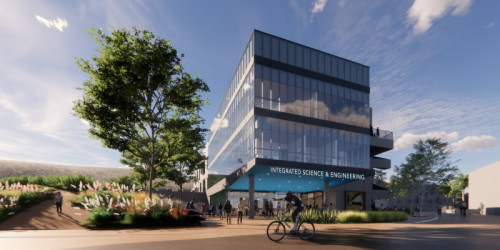
- Labor of Love: New Mom Graduating EarlyThis week, Cameron Aquino will finish her seventh and final semester at Cal State San Marcos, having graduated a semester early with a Bachelor of Arts in psychological science. Barring a disastrous outcome of her finals, she will finish as a member of the College of Humanities, Arts, Behavioral and Social Sciences dean's list in six of her seven semesters. And the one semester she didn’t earn it – fall 2024 – she was a bit preoccupied by having a baby. “And I was really close,” she said of her near-perfect dean’s list record. Aquino will walk in fall commencement at Frontwave Arena in Oceanside during the CHABSS ceremony next week, knowing that she accomplished her goals while allowing nothing to get in the way of her path. And her life journey has been winding. Born in Guam, Aquino has lived in Kentucky, Germany and California. She resided in Germany with her parents after her high school graduation before returning to the U.S. and beginning her undergraduate studies. She maintained the life of a normal college student, working and earning exceptional grades while living with her boyfriend and his family. Then came the surprise. While some students will naturally take a break – her mom was a college student when she got pregnant with her and her brother and never returned to finish her degree – Aquino was determined to not let baby Phoenix be the reason for her slowing down her journey. “Since finding out I was pregnant, I knew I wasn’t going to fall,” she said. “I knew I was going to keep going.” In fact, the preparation and ensuing birth of Phoenix, who turned 1 in November, drove Aquino to quicken her pace. To reach higher to prove to herself, her daughter and her support system that she can accomplish anything. Her near-perfect placement on the dean’s list and overall GPA of 3.67 says otherwise, but it wasn’t easy. “It was a lot of planning,” said Aquino, who commuted from Murrieta throughout her time at CSUSM. “I went through the previous semester and the whole fall semester pregnant, so I had to plan ahead for a lot of things like taking exams early and completing homework assignments early to give myself a cushion. It was a lot of planning with logistics, but I think we made it work.” After the arrival of Phoenix – Aquino wanted a unisex name for a girl just like her own – she went to school mostly in the mornings while her boyfriend attended in the evenings. Gabriel Madrigal is an accounting major who plans to graduate in May. They received help from his parents as well as friends. Aquino is also quick to point out how much CSUSM faculty has helped her in various ways. In particular, Kathie Sweeten, a lecturer who taught an infant and childhood development course while Aquino was pregnant, was influential. Lecturers Neal Dykmans (psychological science) and Melissa McGuire (history) went a long way toward providing an understanding environment. Exactly one week after giving birth, she returned to campus to take a history final. Within days of finishing her finals, she took classes in the subsequent winter session. Aquino said she derives her strength and dedication from her parents. “I get opportunities they never got to pursue higher education,” she said. “Now that she’s born, I want to provide her a better life and a better future than even I had.” Aquino plans to apply for the new Master of Science in clinical counseling psychology program that will start next fall. She has talked to psychological science professors Lisa Graves and Francisco Flores Ramirez about graduate school as she charts a course to eventually earning a Ph.D. in neuropsychology. She wants to work with military veterans. Her parents are coming from Germany to share in her celebration on Monday. Her brother had a baby just last week and he’ll be there, too. Madrigal and his family also will attend. The marking of the moment will be large, no doubt. But to Aquino, there was never an option of not finishing at the highest level she possibly could. “I feel very proud,” she said. “But I also feel like it’s doable. Life just kept throwing things at me left and right all throughout my college years. But it’s nothing you can’t get past or you can’t overcome. It’s just life, and it happens. You take it and you adapt and you do your best with it. “It’s the system of values I’ve had my whole life. No matter how hard it is, life just keeps moving. You’ve got to move along with it.” Media Contact Eric Breier, Interim Assistant Director of Editorial and External Affairs ebreier@csusm.edu | Office: 760-750-7314
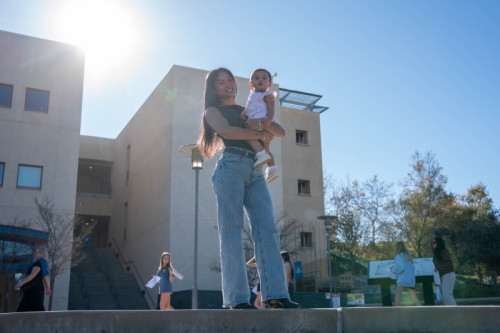
- CEO’s Classroom Experience, Family Legacy Fuel $10M Gift For Hunter HallGreg Hunter never wears a suit to his abstract algebra class at Cal State San Marcos. So when he walked in dressed up one evening, his classmates teased him for being “all dolled up.” Few would guess that he is the CEO of Hunter Industries, a global organization and the largest private employer in San Marcos – or that the company is also a longtime philanthropic partner to CSUSM and is recognized on the campus founders’ seal. To them, he’s just Greg, a student who slips into class with the ease that comes from sharing four semesters with his classmates. “Greg is effortlessly humble, which is so refreshing,” fellow student Travis Bourdon said. “We knew he was a professional but had no idea of the scope. He fits right in, has made friends and encourages us to think about complex concepts differently.” A lifelong learner and Cornell University graduate, Hunter enrolled at CSUSM to challenge himself and strengthen his analytical skills. But the experience quickly became something more as he found himself inspired and motivated by the students around him. “Their grit, backgrounds and excellence impress me, as does the passion and engagement of the faculty,” Hunter said. “CSUSM is a special place with a clear commitment to advancing social mobility and student success across the region. It means a great deal to continue my family’s legacy of support.” This experience, combined with the family’s longstanding commitment to CSUSM, inspired a transformational $10 million gift to fund a new STEM facility. Recently approved by the CSU Board of Trustees, the building will be named Hunter Hall of Science and Engineering and is scheduled to open in fall 2027. Hunter Hall will boost engineering enrollment from 500 to nearly 2,000 students, strengthen the region’s workforce pipeline and support economic growth. “We are deeply grateful to the Hunter family and Hunter Industries for this extraordinary gift,” President Ellen Neufeldt said. “Greg’s experience in the classroom gives him a unique perspective on our students, many of whom are the first in their families to graduate from college. Hunter Hall will be a landmark addition to campus, providing state-of-the-art STEM facilities, fueling regional innovation and strengthening pathways for future graduates.” The Hunter family has helped shape CSUSM’s history for three generations – including Greg’s grandparents, parents and aunt, Ann Hunter-Wellborn, who served on CSUSM's University Council before the campus was founded and has continued to advocate for many student success programs. Over the years, Hunter Industries has supported several pivotal projects, including the Clarke Field House, University Student Union, Hunter Design Lab and state-of-the-art physics laboratories. The company also provides internships, mentorship and faculty support, and employs many CSUSM alumni. As for balancing coursework and running a global company, Greg approaches his studies with the same focus and dedication that define his leadership. “Greg is an exceptional student,” mathematics professor Hanson Smith said. “He even makes time for office hours, which is remarkable for someone who is also a CEO. Students are typically career-focused. Greg already has an extraordinary career, yet he’s here because he loves learning, which is likely what makes him such an effective leader.” With the Hunter gift, CSUSM’s “Blueprint for the Future” campaign – the university’s most ambitious fundraising effort – has raised nearly 80% of its $200 million goal. The campaign reflects the university’s continued growth and its commitment to advancing social mobility across the region. Explore Blueprint for the Future to see how CSUSM is different by design. Media Contact Eric Breier, Interim Assistant Director of Editorial and External Affairs ebreier@csusm.edu | Office: 760-750-7314
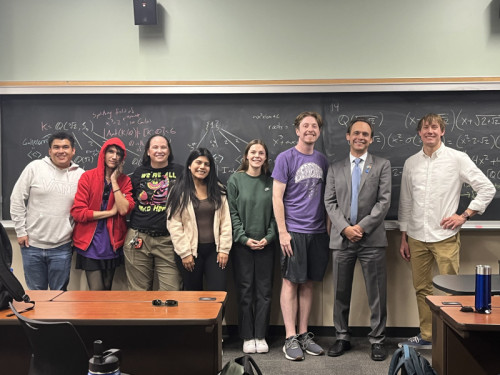
- Finding Growth Through Patience, Campus InvolvementUnlike most children, Quetzalli Johnson wasn’t afraid of visiting the dentist. When she was growing up, her mother always made dentist trips a positive experience for Johnson and her brothers by offering them rewards for doing well in the office. Those positive childhood moments led Johnson to dream of working in health care and dentistry. Today, Johnson is one step closer to fulfilling that dream. “I’m so excited. I feel like the finish line is right there,” said Johnson, a fifth-year general biology major and pre-dental student who's graduating from Cal State San Marcos this month. “I’m really excited to navigate the world outside of school, spend time with my family and husband, and start working as a dental assistant during my gap year.” Along with a gap year to gain experience, Johnson plans to move to North Carolina with her family. She hopes to attend her top choice, the University of North Carolina, to study dentistry and become a dentist. Johnson was an active member of the Pre-Dental Society at CSUSM. She joined the campus organization in spring 2024 and became the social media officer during the 2024-25 academic year. Her efforts in the club helped her achieve the role of senior president this fall. “Being a part of that club taught me a lot about confidence and allowed me to be really comfortable speaking with other students,” she said. “I loved the leadership roles because of what they brought out in myself, and I loved being able to help and support others.” Not only did the Pre-Dental Society give Johnson a place where she belonged, but it also helped her understand the path to dental school. As club president, Johnson has tried to make clear to newer members that they should take their educational journey at their own pace. She often talks about her experience as a fifth-year student and how that extra time has benefited her academically. “I feel like a lot of members think they need to graduate within a certain time, because in high school that’s what we’re told,” Johnson said. “We’re told, ‘You have to graduate college in four years,’ and sometimes that can be a little discouraging. I think it's nice for the members to hear that I’m a fifth-year and see that I’m not defeated by it. I’m enjoying the ride.” Johnson also works hard to make the Pre-Dental Society a welcoming place for students. She encourages members to ask questions, informs them about volunteer opportunities and helps them connect with academic resources and see what lies ahead on the path to dentistry. Her passion for creating and fostering a loving environment is evident to her peers and professors. James Kezos, an assistant professor of biology, has worked closely with Johnson in the classroom and lab. “She is a very determined, hard-working and compassionate individual who has set high goals for herself,” Kezos said. “She is willing to learn and help with any task, showing exceptional levels of initiative and dedication. She excels at whatever responsibilities she undertakes, including her classwork, her research and her extracurriculars such as being president of the Pre-Dental Society.” In the Fly Lab with Kezos, Johnson began studying the physiological adaptations to chronic high-sugar diets in Drosophila (fruit flies) and how these diets affect their heart health and lifespan. Johnson explained that because Drosophila share many genetic traits with humans and have such a short lifespan, they’re ideal subjects for biological study. Alongside the study on high-sugar diets, Johnson has analyzed the Hedgehog signaling pathway in Drosophila heart function. “If we’re discovering new things that could help someone else’s future research, if it could be applied in any way and help the human population, I think that’s really neat,” Johnson said. “I love that we’re taking steps forward to potentially help people. That’s what I want to do in my future, help people.” As the Fly Lab’s sole data analyst, Johnson works closely with the flies’ heartbeats – noting that, in some cases, the flies have a fluorescent heart – by watching videos and turning that information into data through programs like Microsoft Excel. “The biggest impact she has made has been her efforts in implementing a large statistical code to process and analyze our fly cardiac videos,” Kezos said. “Without her help, we would not be able to analyze any of our data, and probably would be struggling with fixing the code.” Creating the code was a challenge that Johnson felt confident in tackling. She had data analysis experience from EOS Fitness, where she worked as a data coordinator. She also took a class on biological data analysis, so when Kezos mentioned that he had code that needed fixing, Johnson was quick to take on the project. It took Johnson roughly two months to go through the nearly 3,000 lines of code. She watched thousands of videos, quantified the data and made it possible for the lab to analyze all of their hard work. Johnson referred to the project as the ultimate puzzle. “It was so frustrating but also really rewarding,” she said. “That went beyond what I thought I was capable of, and just having the belief in myself that I could achieve that, it was such a rewarding feeling. It also strengthened my confidence in myself; I am capable of doing something like that. That was super empowering for me.” Johnson has used these new skills to teach other students in the lab how to use the code to analyze data. “Quetzalli has been an integral member of my lab, and has been a tremendous help in establishing the data analysis process,” Kezos said. “Without her efforts, initiative and care, we would not be as productive as we are today.” When looking back on her time at CSUSM, Johnson said her biggest advice for future students is to get involved. Transferring from Palomar College, Johnson thought she could handle everything on her own at CSUSM. She wasn’t thinking about joining clubs or finding community. But as she delved deeper into her coursework, she realized there was much she still needed to learn about the path ahead. She first heard about the Pre-Dental Society in a Biology 101 class, and the timing felt right. She decided to go to a meeting, and the organization ended up giving her the guidance and support she hadn’t realized she was missing. “I attended a meeting and thought, ‘This is so helpful,’ ” Johnson said. “Then, while I was at these meetings, I saw this community and the relationship between officers and members. I was like, ‘I really want to be a part of this,’ which was new for me. I had never felt like that before.” Being a member of the Pre-Dental Society and volunteering with the Fly Lab helped Johnson grow as a student. The knowledge she gained from both, combined with community support, helped her see how she could give back. Johnson’s newfound desire to get involved led her to participate in events such as the Student Poster Showcase. She presented a poster on the physiological responses to chronic high-sugar diets in Drosophila, the research she had done in the Fly Lab. “Get involved, because it doesn’t hurt; it only helps. You build such a great community and you learn so much. You’re able to meet like-minded people and grow as a human being,” she said. “Enjoy the ride. Enjoy where you’re at in the moment. Enjoy the people around you. Slow down and just enjoy where you’re at.” Media Contact Eric Breier, Interim Assistant Director of Editorial and External Affairs ebreier@csusm.edu | Office: 760-750-7314
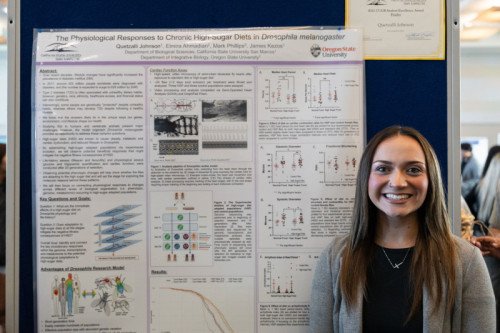
- Climate Action Lesson Connects Students With Young LearnersCal State San Marcos students brought climate action education into a rural sixth-grade classroom through a hands-on lesson focused on food systems and sustainability. The project grew out of Women’s, Gender and Sexuality Studies (WGSS) 304: Ecofeminism, taught by lecturer Kit-Bacon Gressitt. Gressitt incorporated the lesson plan assignment with support from the university’s new Climate Action Sustainability Center, an offer she said she “pounced on.” “Two students jumped on board, Rickie Haynes and Soleia Lafaye, and they dug into the project – much deeper, ultimately, than they originally expected. It was a lot of work,” Gressitt said. Students in the class Education 350: Foundations of Teaching as a Profession were looped into the project through Paula Hewitt, a Distinguished Teacher in Residence at CSUSM. One of Hewitt’s students, Megan Hedges, joined Haynes and Lafaye in the project. The class partnered with Vallecitos Elementary, which Gressitt said was an easy choice given her connection to the school over the past 12 years. “It’s a wonderful, Title 1 school in a rural setting, serving preschool through eighth grade,” Gressitt said. “The school’s sense of community and collaboration is strong, and Superintendent Meliton Sanchez and sixth-grade teacher Jessica Mentze welcomed our students and their project enthusiastically.” Title 1 schools receive federal funding to support students from low-income communities. The lesson introduced sixth-graders to the climate impacts of global food supply chains and offered an adaptive action: growing your own food to reduce greenhouse gas emissions. The CSUSM students guided the class in planting lettuce seeds to take home and helped them map the origins of their favorite foods. “Watching the sixth-graders ask and answer questions while planting lettuce to take home to their families was a joy,” Gressitt said. “They quickly grasped the differences between having a family garden and the climate pollution that results from shipping produce around the globe. “The most revealing evaluation of the students’ work is that the Vallecitos folks were pleased with the lesson and invited CSUSM back next semester.” Media Contact Eric Breier, Interim assistant director of editorial and external affairs ebreier@csusm.edu | Office: 760-750-7314
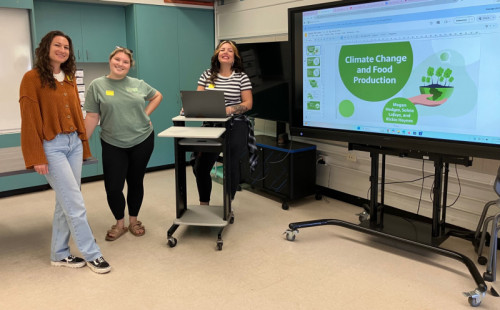
- Cancer Survivor Spreads Awareness Through LegosWhen asked why he wants to be a doctor, Cristian Alvizo would often answer, “Because I like science and I love to help people.” But there was always so much more hidden behind that answer, including a diagnosis that altered Alvizo’s entire outlook on life. It wasn’t until he met one of his colleagues and mentors in a lab at Cal State San Marcos that Alvizo realized he needed to change his answer to that question. Alvizo was diagnosed with testicular cancer the day before his high school graduation. He attended a physical required for his high school golf team that didn’t thoroughly examine for testicular cancer. After his appointment, he felt the need to self-screen, and that’s when he noticed something was off. He requested another appointment – disguising it as an HPV vaccination so his parents wouldn’t worry – where he was advised to receive an ultrasound and meet with a urologist. After a month-and-a-half of anxiously waiting, Alvizo met with Jeffrey Zeitung, a urologist at the Scripps Clinic in La Jolla, who delivered devastating news: Alvizo had testicular cancer and needed an orchiectomy, which is the removal of one or both testicles. Alvizo remembers thinking: “I'm 18, I graduate tomorrow, my mom is in the waiting room, I was just told I have testicular cancer and now I have to get an orchiectomy next week. This is a lot at once.” But Zeitung made Alvizo feel comfortable in a very uncomfortable situation, assuring him that they would get through this diagnosis together. He guided Alvizo through the process, teaching him about the disease and comforting him with the knowledge that 99% of testicular cancer patients end up fine. “Seeing how my urologist comforted me during this time made me want the privilege to be in that same position for other patients as well,” Alvizo said. “It inspired me to move down the path of becoming a physician.” Since his diagnosis, Alvizo, who is graduating from CSUSM this month with a bachelor's degree in biology and a minor in Spanish, has involved himself in numerous opportunities to further his education and spread awareness for cancer patients. His biggest contribution has been the creation of a nonprofit organization called Bricks for Change. Started by Alvizo and a few friends, Bricks for Change aims to spread awareness for all types of cancer. “You usually hear about Breast Cancer Awareness Month, which is in October, and outside of that, maybe Childhood Cancer Awareness Month in September. But you don't often hear about the other ones, so our goal is to spread awareness for the cancers of every month,” Alvizo said. The nonprofit raises money to donate Lego sets to kids in the hospital with cancer. Since the organization launched in October 2024, it have donated 550 Lego sets ($9,000 total value) between Rady Children’s Hospital in San Diego and MemorialCare Miller Children's & Women's Hospital in Long Beach. Included in every child’s Lego set is a card that allows patients to share a photo of themselves with the set they built. The pictures are posted to the Bricks for Change Instagram page and website with clearance from the hospital. Alvizo plans to continue this organization for the rest of his life and is working toward making it a 501(c)(3) nonprofit to attract the involvement of larger companies and more funding. He also hopes to build connections with more hospitals as he begins medical school. This isn’t the only advocacy Alvizo has done for cancer awareness. He is heavily involved with the Testicular Cancer Awareness Foundation and ran his first marathon to raise money for testicular cancer awareness. Since then, he has found a passion for running and has completed seven marathons and 19 half-marathons for various charities. He has been asked to speak at the American Urological Association on behalf of the Testicular Cancer Awareness Foundation. Alvizo is finishing his last semester at CSUSM, where he has been a member of professor Julie Jameson’s biology lab since he was a senior in high school. After reaching out to her via email while in high school, Alvizo was invited to join her lab, in which they studied inflammation in the skin relating to various diseases like psoriasis and obesity. Alvizo co-published two scientific papers during his time in the lab and traveled with his lab colleagues to conferences to present their findings. Alvizo is also a STEM ambassador for CSUSM's Center for Research and Engagement in STEM Education (CRESE). Every week, CRESE ambassadors visit middle and elementary schools in the region to lead after-school programs and STEM-based projects to get kids interested in science. In addition, they staff a booth every March at Super STEM Saturday, which is where Alvizo first found his love for science as a middle schooler many years ago. Clinical experience is required to apply for medical school, so Alvizo has been interning at Palomar Hospital for the last two years as a weekly hospice volunteer. He has worked on both the ICU floor and in the emergency department, checking in on patients and providing them comfort. Alvizo also is in the process of obtaining his EMT license so he can transition into a paid clinical position during his gap year before medical school applications open in June 2026. Recently, Alvizo has had the opportunity to shadow Aditya Bagrodia, a urologist researching testicular cancer tumor markers in the blood at UC San Diego, as well as urologist Ramdev Konijeti, who works closely with Alvizo’s urologist at the Scripps Clinic. “It's been a privilege to have a full-circle moment where I'm at the same cancer center, in the exact same room I was diagnosed, but now I get to see it from the other way around. It's really surreal,” Alvizo said. So now, when asked why he wants to be a doctor, Alvizo isn’t hesitant to tell his story. He is reminded of words from a former lab colleague, Alex Gonzalez, who is also a cancer survivor: “Every cancer patient has their own story. Just even hearing a diagnosis of cancer is a big deal. But you have a way of advocating that a lot of other people don't because you are young and healthy. Your interest in becoming a doctor will go a long way for spreading the word about cancer awareness.” Which is exactly what Alvizo plans to do. Media Contact Eric Breier, Interim Assistant Director of Editorial and External Affairs ebreier@csusm.edu | Office: 760-750-7314
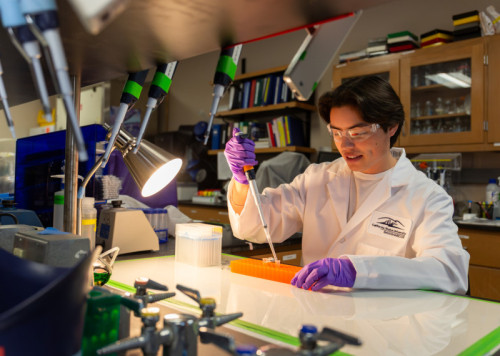
- Youth Lego Challenge Puts Archaeology Professor in DemandFor Jon Spenard, the start of this school year was hectic beyond the typical reasons – and beyond his wildest imagination. Spenard, you see, is an archaeology professor at Cal State San Marcos, and it was in about late August that archaeologists from around the world suddenly found themselves being bombarded with attention. As Spenard can attest, that’s not the normal reality for a scholar in his field. The reason for the surprising interest in archaeology? In August, the FIRST (For Inspiration and Recognition of Science and Technology) Lego League Challenge – an international competition for elementary and middle school students that attracts almost 700,000 kids – released its annual theme: “Unearthed.” As the website states: “Every artifact we uncover holds a story. Each tool, each innovation, each work of art connects us to the people and ideas that came before us. Using STEM skills and teamwork, today we can dig deeper into discoveries than ever before.” Almost overnight, Spenard was on speed dial. “No one was expecting this,” Spenard said. “Every archaeologist and museum I know was suddenly flooded with calls and messages requesting meetings.” So it was that on the afternoon of Nov. 24, Spenard met with a FIRST Lego League team named Bikini Bottom Brick Builders – three middle school girls from Temecula and their parents – in the Social and Behavioral Sciences Building. The team was trying to build a LiDAR scanner – an acronym for “Light Detection and Ranging,” LiDAR is a remote sensing method for creating 3D models of the real world – and Spenard talked to them about how the technology works, how it relates to archaeology and how they could use their newfound knowledge to make better scans. That consulting session was the latest of about a dozen that Spenard has conducted this semester – some on campus, some by email, some at a public archaeology event that he attended in October (Arch in the Park in San Diego). “The groups and their parents do deep research,” he said. “I think many found me through our departmental website.” Each year, the FIRST Lego League introduces schoolkids to a scientific and real-world challenge that will be the focus of their research. The competition involves designing and programming robot prototypes with Legos to complete tasks, and working out a solution to a problem related to the theme. The students meet for regional, national and international tournaments to compete, compare ideas and display their robots. Spenard’s assistance to teams in the region has run the gamut, from conveying the general nature of archaeology – hint: as he says, “it’s not dinosaurs!” – to listening to presentations to providing feedback on early design prototypes. Though wholly out of the blue, the experience has been a rewarding one for him. “My hope, more than anything, is that these kids have walked away with a much better understanding of what archaeology is and how it is done,” Spenard said. “My impression is that, collectively, these kids are doing amazing engineering work that will revolutionize the field of archaeology and many others someday.” Media Contact Brian Hiro, Communications Specialist bhiro@csusm.edu | Office: 760-750-7306
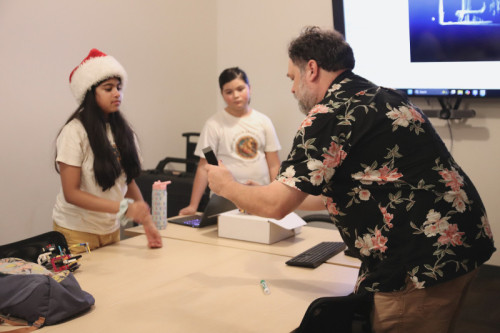
- County Grant Will Help CSUSM Build Health WorkforceCal State San Marcos has received a $450,000 grant from the County of San Diego to continue its work in helping to develop the health and human services workforce in the region. The funding is half of a $900,000 grant that the county was awarded from Health Career Connection (HCC), a national nonprofit working to expand opportunities for students of diverse backgrounds and inspire a new generation of health leaders. The grant is designed to facilitate collaboration between the county’s Health and Human Services Agency (HHSA) and partner organizations including CSUSM and San Diego State, which received the other $450,000. The new HCC grant funds will support the Live Well Center for Innovation and Leadership, a county academic-practice partnership with SDSU and its expansion to include CSUSM. It also complements existing HHSA initiatives to drive meaningful progress in workforce development across the region. CSUSM and the College of Education, Health and Human Services (CEHHS) will utilize the money to achieve three primary outcomes: the creation of the CSUSM Center for Health Workforce Solutions; under that center, the creation of a Live Well San Diego/CSUSM Academic Health Department; continued collaborations in North County around the behavioral and mental health workforce, including an annual symposium and associated strategic action groups. “This grant will be transformative for our students and the region in addressing behavioral and mental health workforce shortages,” said Jennifer Ostergren, dean of CEHHS. “It reflects our ongoing commitment to collaborate with community partners to support the needs of the region.” The grant-funded initiative will work in tandem with CSUSM’s new Scholars in Wellness and Innovation Fast-Track (SWIFT) Health Programs, an accelerated, three-year bachelor’s program for students interested in preparing for mental and behavioral health professional opportunities. SWIFT was created from a historic $10 million grant to CSUSM from Price Philanthropies Foundation last year. San Diego County faces a worsening health and human services workforce shortage due to workers getting older and retiring or leaving for other jobs. According to a 2022 San Diego Workforce Partnership report, the region needs to double its behavioral health workforce by 2027. Beyond behavioral health, there is a persistent demand for other licensed professionals, including nurses, therapists and social workers. A national model in academic-practice partnership, the Live Well Center for Innovation and Leadership was the first of its kind in California when it launched in 2022.
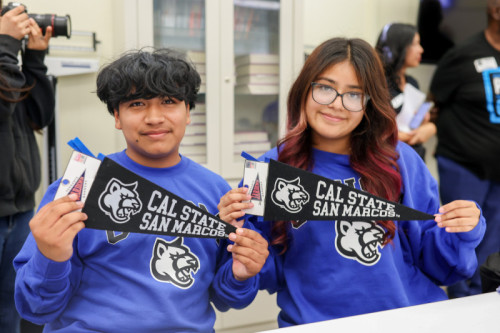
Load more...
Loading...


